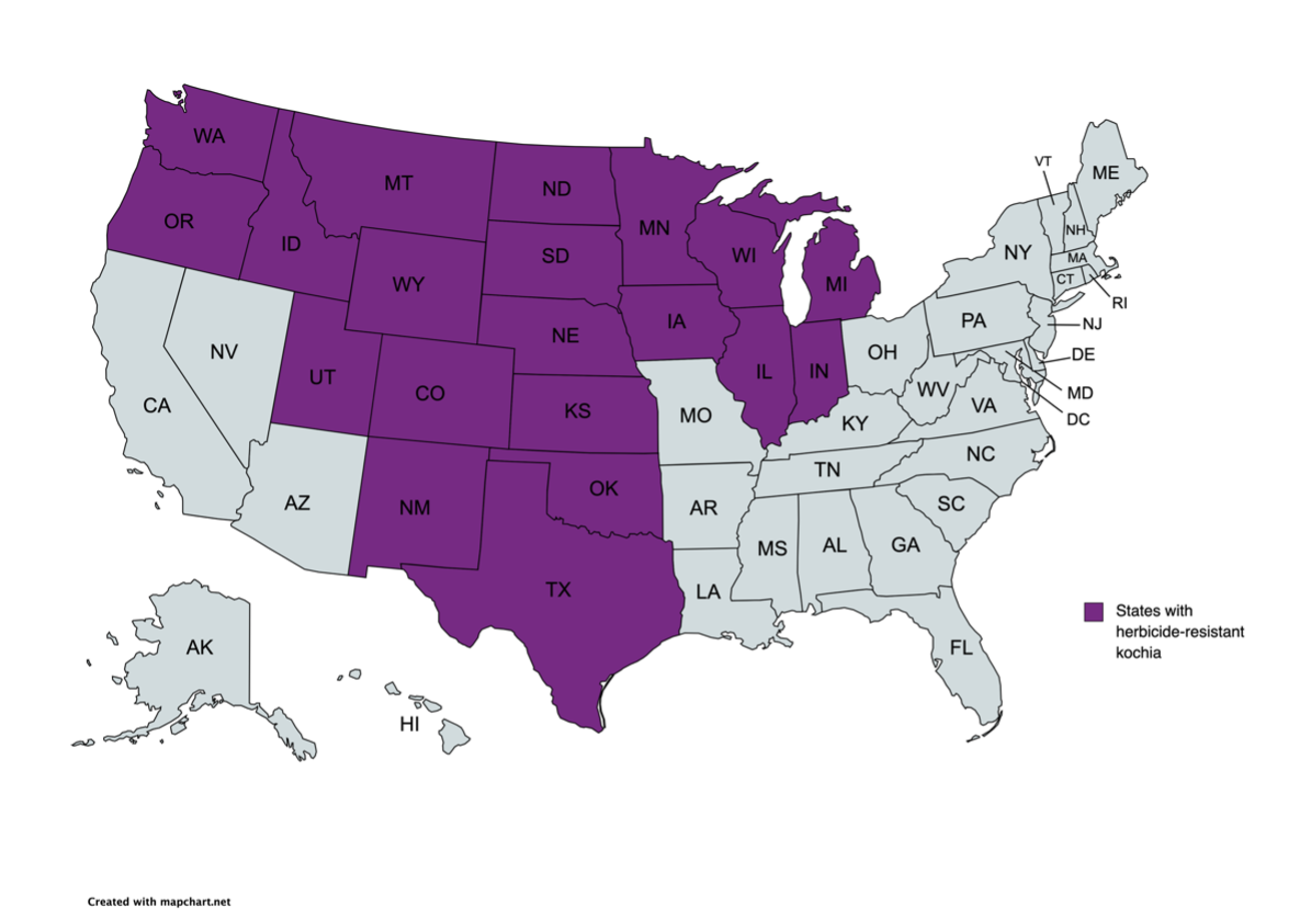Kochia is an early emerging summer annual weed that flourishes in hot and arid conditions. Herbicide-resistant kochia can be found in several states, and this competitive weed is proven to reduce row-crop yield by as much as 70%.1
- Common names: Kochia, Mexican fireweed, Mirabel, mock cypress
- Scientific name: Bassia scoparia
- Cotyledons: Lance- or linear-shaped, dull green and smooth
- Leaf shape: Lance- or linear-shaped, grayish green and flat with soft hairs
- Stems: Branched, round and purple to red in color, with hairs
- Flowers: Green flowers with hairy bracts
- Reproduction: Monoecious (male and female attributes on one plant)
Fast facts
- Mature kochia plants grow up to 7 feet tall, with an extensive root system that can extend 15 feet into the soil and 21 feet in diameter.1
- Young kochia plants may be confused with lambsquarters seedlings. To identify young immature kochia, look for highly branched growth patterns with hairs occurring along the leaf.
- Adult kochia plants can produce up to 30,000 seeds.1
- The weed seeds spread via a “tumbleweed” mechanism, meaning a mature stem will detach from its base and then be blown around by the wind.
- Seeds do not remain viable in the soil for an extended period, but they exhibit a high initial germination rate. Under favorable conditions, seeds initiate germination within two to three hours and seedlings establish quickly.1
- Heavy infestations of kochia are known to cause as much as 70% yield loss in row crops. The plants also can interfere with harvest by getting tangled up in machinery.1
- Kochia populations have been found with resistance to at least four herbicide groups: Group 2 (ALS inhibitors), Group 4 (synthetic auxins), Group 6 (photosystem II inhibitors) and Group 9 (EPSP synthase inhibitors).1
- According to WeedScience.org, herbicide-resistant kochia has been found in crops in 20 states. In addition, the weed has shown resistance to herbicides in noncrop areas like railways, roadsides, and industrial sites in Indiana, Idaho, Kansas, Iowa, New Mexico and Utah.

Control tips
- Controlling kochia at an early stage is vital to prevent yield loss. Encourage customers to start each spring with tillage and/or a burndown herbicide application to control kochia.
- Apply the burndown shortly after the first flush of kochia has emerged.
- Following the burndown, customers should use a program approach that includes preemergence and postemergence applications with multiple modes of action and residual activity.
For Enlist E3® soybeans, applying Sonic® herbicide preemergence followed by a postemergence mix of Enlist One® herbicide and Liberty® herbicide can be a powerful program against kochia.
- It’s important to note that kochia is very adaptable to hot, dry conditions. In drought or dry weather conditions, the weed can develop a thick cuticle around the leaves, which makes it harder to absorb herbicides. Using the right adjuvants can help combat this issue.
- Rotation between grass and broadleaf crops also can help control kochia. Winter wheat is highly recommended for suppressing the weed.1
1United Soybean Board. 2023. Kochia. https://iwilltakeaction.com/weed/kochia
™ ® Enlist E3, Enlist One, EverpreX herbicide, Kyro, Resicore, Sonic and SureStart are trademarks of Corteva Agriscience and its affiliated companies. ® Liberty is a registered trademark of BASF. The transgenic soybean event in Enlist E3® soybeans is jointly developed and owned by Corteva Agriscience and M.S. Technologies L.L.C. Enlist Duo® and Enlist One® herbicides are not registered for sale or use in all states or counties. Contact your state pesticide regulatory agency to determine if a product is registered for sale or use in your area. Enlist Duo and Enlist One herbicides are the only 2,4-D products authorized for use with Enlist® crops. Consult Enlist herbicide labels for weed species controlled. EverpreX® herbicide, Kyro™, Resicore®, Sonic® and SureStart® II are not registered for sale or use in all states. Kyro, Resicore and SureStart II are not available for sale, distribution or use in Nassau and Suffolk counties in the state of New York. Contact your state pesticide regulatory agency to determine if a product is registered for sale or use in your state. Consult the label before purchase or use for full details. Always read and follow label directions.

